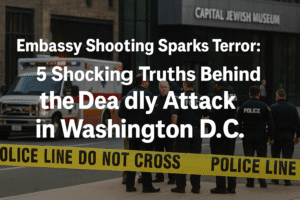Embassy Shooting Sparks Terror: 5 Shocking Truths Behind the Deadly Attack in Washington D.C.
A targeted shooting outside Washington D.C.’s Capital Jewish Museum has left two Israeli Embassy staffers dead in an act authorities describe as a premeditated hate crime and terrorism. The victims, Sarah Milgrim, a 28-year-old American, and Yaron Lischinsky, a 31-year-old Israeli, were a couple planning to announce their engagement. The suspect, Elias Rodriguez, 31, allegedly ambushed them as they left a peace-focused diplomatic event, later declaring, “I did it for Palestine” during his arrest. Court documents reveal Rodriguez flew from Chicago with a handgun, purchased a last-minute ticket to the event, and praised a prior anti-Israel protester who died by self-immolation.
The attack underscores escalating domestic extremism linked to the Israel-Hamas war, with antisemitic incidents rising sharply since 2023. Israeli missions globally have tightened security, while interfaith communities mourn the loss of two individuals dedicated to bridging cultural divides. The tragedy amplifies calls to address radicalization and protect dialogue in an increasingly fractured world.

Embassy Shooting Sparks Terror: 5 Shocking Truths Behind the Deadly Attack in Washington D.C.
The fatal shooting of two Israeli Embassy staffers outside Washington’s Capital Jewish Museum has reverberated globally, underscoring how overseas conflicts increasingly ignite violence on American soil. The attack, which authorities describe as a calculated act of terrorism rooted in antisemitism, claimed the lives of Sarah Milgrim, 28, and Yaron Lischinsky, 31—a couple poised to announce their engagement. Their deaths highlight the human cost of geopolitical strife and the urgent challenges of combating hate-driven violence.
A Night of Celebration Turned Horror
On Wednesday evening, attendees of the American Jewish Committee’s Young Diplomats reception—an event focused on interfaith humanitarian efforts—were abruptly thrust into chaos. As guests departed, Elias Rodriguez, 31, allegedly opened fire on Milgrim and Lischinsky, pursuing them as they fell and firing additional shots before fleeing. Witnesses described Rodriguez pacing outside the museum earlier, his behavior marked by unsettling intensity.
Surveillance footage captured the chilling precision of the attack, with Rodriguez reloading his weapon mid-assault. He later reentered the museum, declaring, “I did it,” and shouted “Free Palestine” during his arrest. Court documents reveal he traveled from Chicago with a handgun, purchased an event ticket hours prior, and expressed admiration for an Air Force member who self-immolated outside the Israeli Embassy in 2024, whom he called a “martyr.”
Victims Remembered: Bridges Between Worlds
Milgrim, a Kansas native, was celebrated for her dedication to sustainability and peacebuilding. Colleagues recalled her warmth and commitment to fostering Jewish-Christian dialogue. “She believed in people-to-people connections, even in divisive times,” said Ted Deutch of the American Jewish Committee.
Lischinsky, an Israeli-German national, served in the Israel Defense Forces and studied conflict resolution. A Messianic Jewish congregant, he sought to bridge his Christian upbringing with Zionist values. “Yaron challenged his own beliefs to find common ground,” shared friend David Boskey. His Instagram bio, featuring a yellow hostage-solidarity ribbon, reflected his hopes for reconciliation amid war.
Broader Implications: Conflict Spillover and Domestic Security
The attack amplifies concerns that the Israel-Hamas war, now in its eighth month, is exacerbating domestic extremism. FBI data shows a 337% surge in antisemitic incidents since October 2023, with Islamophobic hate crimes also rising. Rodriguez’s alleged manifesto, circulating online, condemns Israeli military actions in Gaza—a narrative law enforcement is scrutinizing for links to broader networks.
Jeanine Pirro, D.C.’s interim U.S. Attorney, emphasized the case’s dual classification as both a hate crime and terrorism, signaling severe penalties. While the death penalty looms, the trial will likely probe Rodriguez’s radicalization journey and potential influences.
Community and Diplomatic Repercussions
Israeli missions globally have heightened security, with Ambassador Yechiel Leiter calling the victims “ambassadors of hope.” Meanwhile, Palestinian advocacy groups swiftly condemned the violence. “Political grievances must never justify harming civilians,” stated the U.S. Campaign for Palestinian Rights.
Local Jewish institutions, already on alert since 2023, face renewed anxiety. “This was an attack on our shared humanity,” said Rabbi Lauren Holtzblatt, addressing interfaith vigils held citywide.
A Call for Nuance in Fractured Times
As families mourn, the tragedy sparks difficult conversations about balancing free speech with public safety, addressing root causes of radicalization, and fostering empathy across divides. For Milgrim and Lischinsky, whose lives embodied bridge-building, their legacy may lie in urging communities to confront hatred without losing sight of our shared dignity.
The road ahead demands vigilance—not just in securing embassies, but in safeguarding the ideals of dialogue that extremists seek to shatter.
You must be logged in to post a comment.